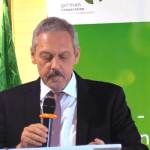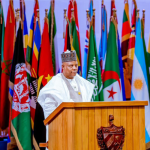Vice President, Kashim Shettima has called for public-private partnerships to develop the infrastructure required to harness hydrogen energy’s potential.
This appeal was made during the opening of Nigeria’s inaugural hydrogen conference in Abuja.
The global demand for hydrogen reached approximately 94 million metric tons in 2022, according to the International Energy Agency.
By 2050, this figure is projected to grow to between 500 and 700 million metric tons annually, aligning with net-zero emission targets.




In a landmark move, Nigeria hosted its first hydrogen conference, focusing on creating a framework to scale up the production, storage, and distribution of green hydrogen.
Vice President Kashim Shettima highlighted the critical need for human capital development in hydrogen technologies and urged private sector participation to drive progress in this emerging industry.
Minister of State for Petroleum Resources, Ekperikpe Ekpo, underscored the importance of developing a sustainable hydrogen economy to address Nigeria’s growing energy needs, which are expected to double by 2030.
With abundant renewable energy sources and vast natural gas reserves, Nigeria is well-positioned to become a key player in the global hydrogen economy.
Experts predict that hydrogen could transform power generation, transportation, and manufacturing in Nigeria, potentially establishing the country as a leader in green hydrogen production.














